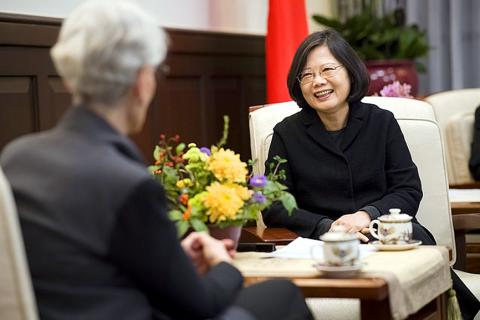President Tsai Ing-wen (蔡英文) yesterday urged unity across political lines against China as Sao Tome and Principe broke diplomatic ties with Taiwan.
The African nation’s decision to terminate ties with Taiwan, as well as changes in the international situation, pose a major challenge to Taiwan diplomatically, Tsai said at a meeting of the Democratic Progressive Party’s (DPP) Central Standing Committee at the party’s headquarters in Taipei.
“At a time of change, national solidarity across party lines is increasingly needed to fight against foreign forces,” DPP spokesman Yang Chia-liang (楊家俍) quoted Tsai as saying. “China has never stopped suppressing Taiwan’s international participation and diplomatic efforts.”

Photo: courtesy of the Presidential Office
China is behind a series of diplomatic setbacks Taiwan has faced, including the Gambia’s decision to sever diplomatic ties in 2013, the disrespectful treatment former president Ma Ying-jeou (馬英九) was subject to in Malaysia last month and Sao Tome and Principe’s announcement yesterday, Tsai said.
“As those incidents clearly suggest, China’s intervention occurs regardless of which party is in charge of the [Taiwanese] government,” she said.
China’s diplomatic isolation of Taiwan is directed against the entire population instead of specific political parties, Tsai said, adding that such practices are counterproductive to long-term cross-strait development and alienate Taiwanese.
In face of these challenges, the government must adopt a pragmatic diplomatic policy to broaden the scope of the nation’s international cooperation and improve Taipei’s relations with other nations on a mutually beneficial basis, she said.
Since Tsai was inaugurated in May, it has been the government’s top priority to increase the nation’s global presence and re-evaluate the unfair treatment the nation has been subject to, Tsai said, reiterating that the nation would not ease its diplomatic efforts.
“While divergence and conflict are common between the ruling and opposition parties, it is time we united against foreign forces to protect the national interest,” Tsai said.
Presidential Office spokesman Alex Huang (黃重諺) said Tsai met with government officials at noon to respond to the incident.
The participants included National Security Council Secretary-General Joseph Wu (吳釗燮), Premier Lin Chuan (林全), Minister of Foreign Affairs David Lee (李大維), Mainland Affairs Council Minister Katharine Chang (張小月) and central bank Governor Perng Fai-nan (彭淮南).
Huang said the president issued three instructions following the meeting: it is unnecessary for Taiwan to engage in “checkbook diplomacy” and it should maintain its stance of assisting diplomatic allies based on the principles of equality, reciprocity and mutual prosperity; that Beijing’s attempts to limit Taiwan’s international participation cause damage to the global community and cross-strait development; and finance-related government agencies should closely monitor the stock market in the aftermath of the break.
Additional reporting by CNA

MORE VISITORS: The Tourism Administration said that it is seeing positive prospects in its efforts to expand the tourism market in North America and Europe Taiwan has been ranked as the cheapest place in the world to travel to this year, based on a list recommended by NerdWallet. The San Francisco-based personal finance company said that Taiwan topped the list of 16 nations it chose for budget travelers because US tourists do not need visas and travelers can easily have a good meal for less than US$10. A bus ride in Taipei costs just under US$0.50, while subway rides start at US$0.60, the firm said, adding that public transportation in Taiwan is easy to navigate. The firm also called Taiwan a “food lover’s paradise,” citing inexpensive breakfast stalls

TRADE: A mandatory declaration of origin for manufactured goods bound for the US is to take effect on May 7 to block China from exploiting Taiwan’s trade channels All products manufactured in Taiwan and exported to the US must include a signed declaration of origin starting on May 7, the Bureau of Foreign Trade announced yesterday. US President Donald Trump on April 2 imposed a 32 percent tariff on imports from Taiwan, but one week later announced a 90-day pause on its implementation. However, a universal 10 percent tariff was immediately applied to most imports from around the world. On April 12, the Trump administration further exempted computers, smartphones and semiconductors from the new tariffs. In response, President William Lai’s (賴清德) administration has introduced a series of countermeasures to support affected

CROSS-STRAIT: The vast majority of Taiwanese support maintaining the ‘status quo,’ while concern is rising about Beijing’s influence operations More than eight out of 10 Taiwanese reject Beijing’s “one country, two systems” framework for cross-strait relations, according to a survey released by the Mainland Affairs Council (MAC) on Thursday. The MAC’s latest quarterly survey found that 84.4 percent of respondents opposed Beijing’s “one country, two systems” formula for handling cross-strait relations — a figure consistent with past polling. Over the past three years, opposition to the framework has remained high, ranging from a low of 83.6 percent in April 2023 to a peak of 89.6 percent in April last year. In the most recent poll, 82.5 percent also rejected China’s

PLUGGING HOLES: The amendments would bring the legislation in line with systems found in other countries such as Japan and the US, Legislator Chen Kuan-ting said Democratic Progressive Party (DPP) Legislator Chen Kuan-ting (陳冠廷) has proposed amending national security legislation amid a spate of espionage cases. Potential gaps in security vetting procedures for personnel with access to sensitive information prompted him to propose the amendments, which would introduce changes to Article 14 of the Classified National Security Information Protection Act (國家機密保護法), Chen said yesterday. The proposal, which aims to enhance interagency vetting procedures and reduce the risk of classified information leaks, would establish a comprehensive security clearance system in Taiwan, he said. The amendment would require character and loyalty checks for civil servants and intelligence personnel prior to